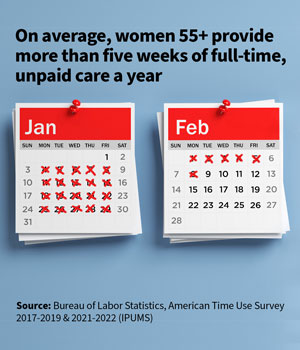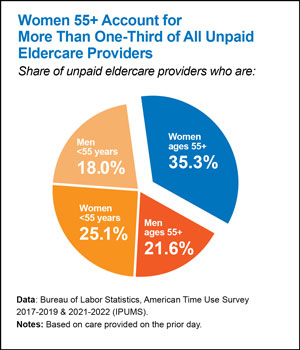
Older women are critical to the care infrastructure of the U.S. Not only are they disproportionately concentrated in paid caregiving occupations, but they supply millions of hours of unpaid care to family and friends, as well. This care is crucial for the care recipients themselves; but more broadly, it allows employees to work and thrive, and the U.S. economy to function.
Caregiving can be extremely rewarding, but it often comes at a financial cost to the caregiver in terms of reduced paid work hours, lost wages and lower retirement income. Women in general are hard hit by such caregiving penalties, given their greater likelihood of shouldering caregiving obligations; and older women, in particular, have fewer years left to “make up” for any foregone earnings or work hours.
National Family Caregivers Month is a time to put a spotlight on the importance of these women in upholding the economy, as well as the need to provide support for them.
Here are five numbers from just released Women’s Bureau research highlighting how essential older women are to unpaid caregiving in the U.S.:
26.6 million hours
 In total, U.S. women ages 55 and older are providing 26.6 million hours of unpaid care to family and friends on a daily basis. This figure captures care provided to recipients of all ages, and includes people who live with the caregiver, as well as those who reside elsewhere.
In total, U.S. women ages 55 and older are providing 26.6 million hours of unpaid care to family and friends on a daily basis. This figure captures care provided to recipients of all ages, and includes people who live with the caregiver, as well as those who reside elsewhere.
More than 5 weeks
Over the course of a year, the average U.S. woman aged 55 or older provides 182 hours of unpaid care. This is the equivalent of 26 days of full-time (35 hours/week) work.
23.5% of women 55+
Almost one-fourth (23.5%) of women 55 and older provide some form of unpaid caregiving on any given day. Some 9.5% of these women provide care to a minor child daily, and 15.6% provide care to an adult (and some are providing care to both kids and adults). Adult care encompasses different types of caregiving, such as supporting a family member with disabilities, helping a spouse recovering from surgery or assisting aging parents. On average, women 55 and older who provide unpaid care spend more than 2 hours a day doing so.
 2.3 million children
2.3 million children
In 2021, 2.3 million children had a grandmother who was responsible for most of their daily needs. Put another way, 3.2% of all U.S. children younger than 18 were living with and being raised by a grandmother – and in most cases, grandmothers had been raising these kids for at least one year. Rates of grandmother caregiving differ markedly by geography: 6.4% of all children in West Virginia and New Mexico were being raised by a grandmother, while the figure was 1.3% of children in Vermont.
35.3% of unpaid eldercare providers
Eldercare is – and will continue to be – a critical need in the U.S., as the country continues to age. Women 55 and older account for more than one-third (35.3%) of all people providing unpaid eldercare in the U.S. – that is, care for someone with a chronic, age-related condition -- on any given day. All told, 8.8% of women 55 and older provide eldercare to a friend or family member on an average day, and about one-fourth (24.5%) provide such care at least once a month.
Gretchen Livingston is a survey statistician in the department’s Women’s Bureau. Follow the bureau on Twitter at @WB_DOL.

 U.S. Department of Labor Blog
U.S. Department of Labor Blog